Abstract
In Thailand Plasmodium falciparum malaria is highly resistant to available antimalarials. Investigations on the efficacy of existing antimalarials and of alternative drugs are urgently needed. Artesunate has been shown to be effective against falciparum malaria, but is associated with a high recrudescence rate. We have carried out a comparative clinical trial of the standard regimen of quinine + tetracycline versus oral artesunate at a 700-mg total dose given over 5 days to patients with acute uncomplicated falciparum malaria. The 64 male patients who took part in the study were randomized to receive either quinine-tetracycline (33 patients) or oral artesunate (31 patients). All the patients were admitted to the Bangkok Hospital for Tropical Diseases for 28 days. Oral artesunate had faster parasite and fever clearance times than the combination quinine-tetracycline, but the cure rate was not significantly different for the two regimens. However, the occurrence of adverse effects, such as tinnitus, was significantly higher in the quinine-tetracycline group. Surprisingly nausea and dizziness were rather common with artesunate. The possibility of neurological adverse effects for artesunate should also be borne in mind. Oral artesunate (700 mg given over 5 days) is effective and better tolerated than the combination quinine-tetracycline. The cure rate we obtained is higher than that reported in previous studies with 600 mg of oral artesunate given over 5 days. Oral artesunate can be considered as an alternative drug for multiple-drug-resistant falciparum malaria; however, adverse effects, particularly neurotoxicity, should be closely monitored before its widespread use can be recommended.(ABSTRACT TRUNCATED AT 250 WORDS)
Full text
PDF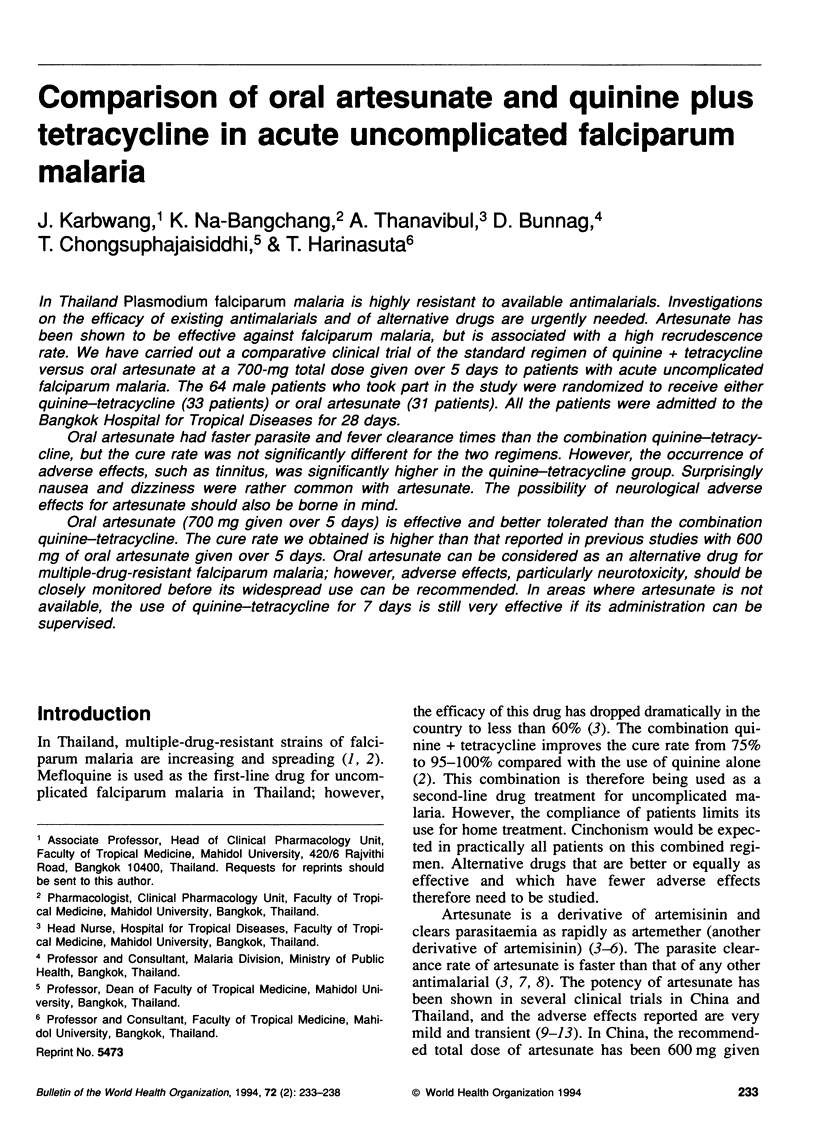
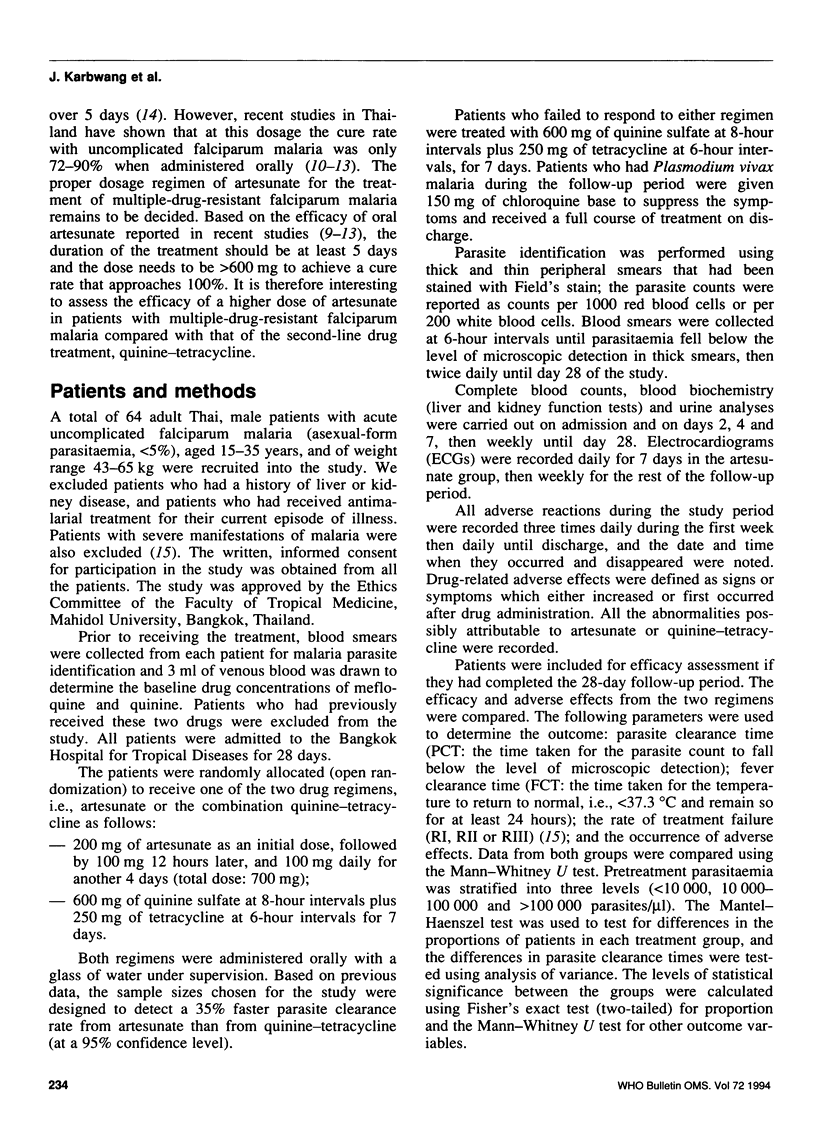
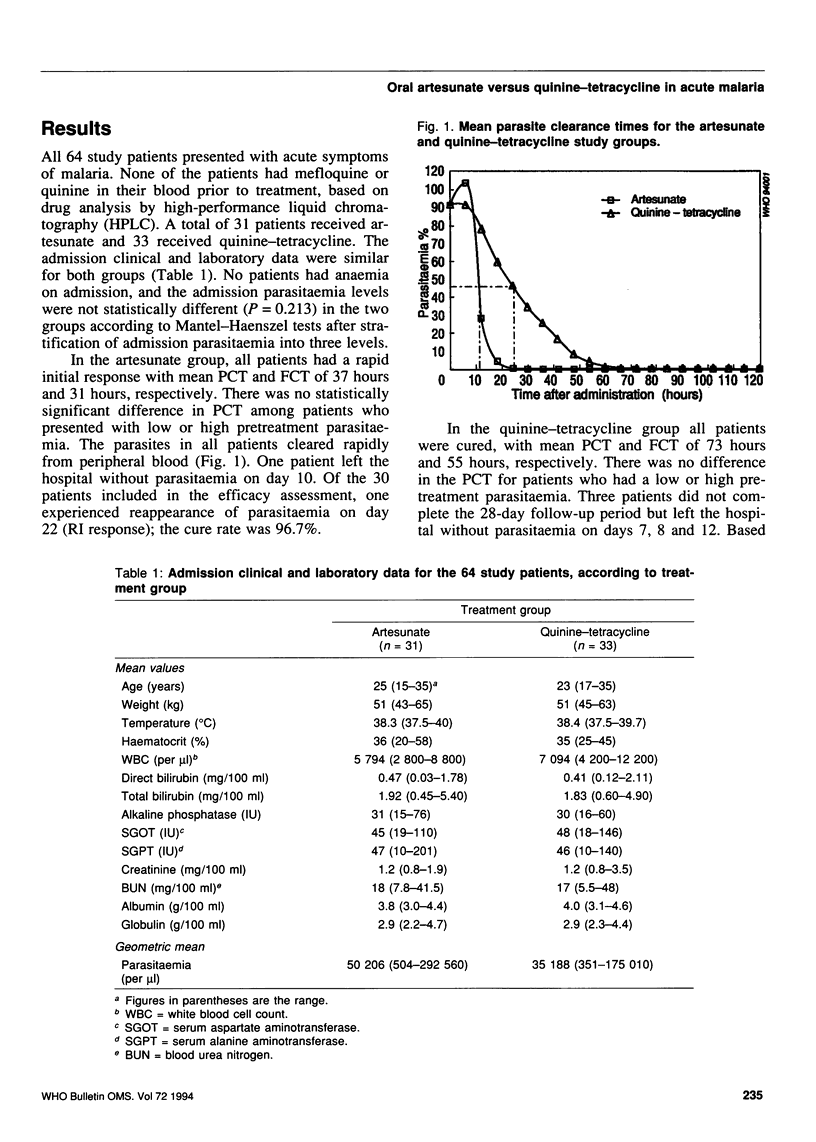
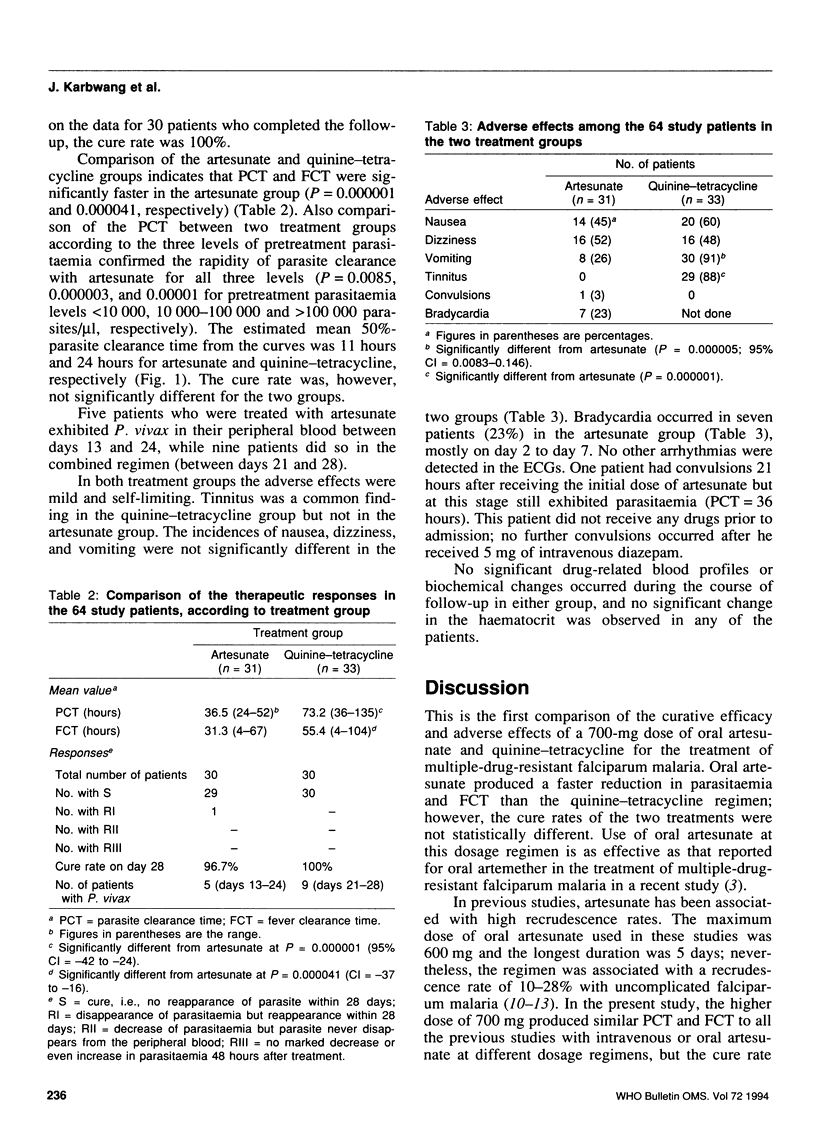
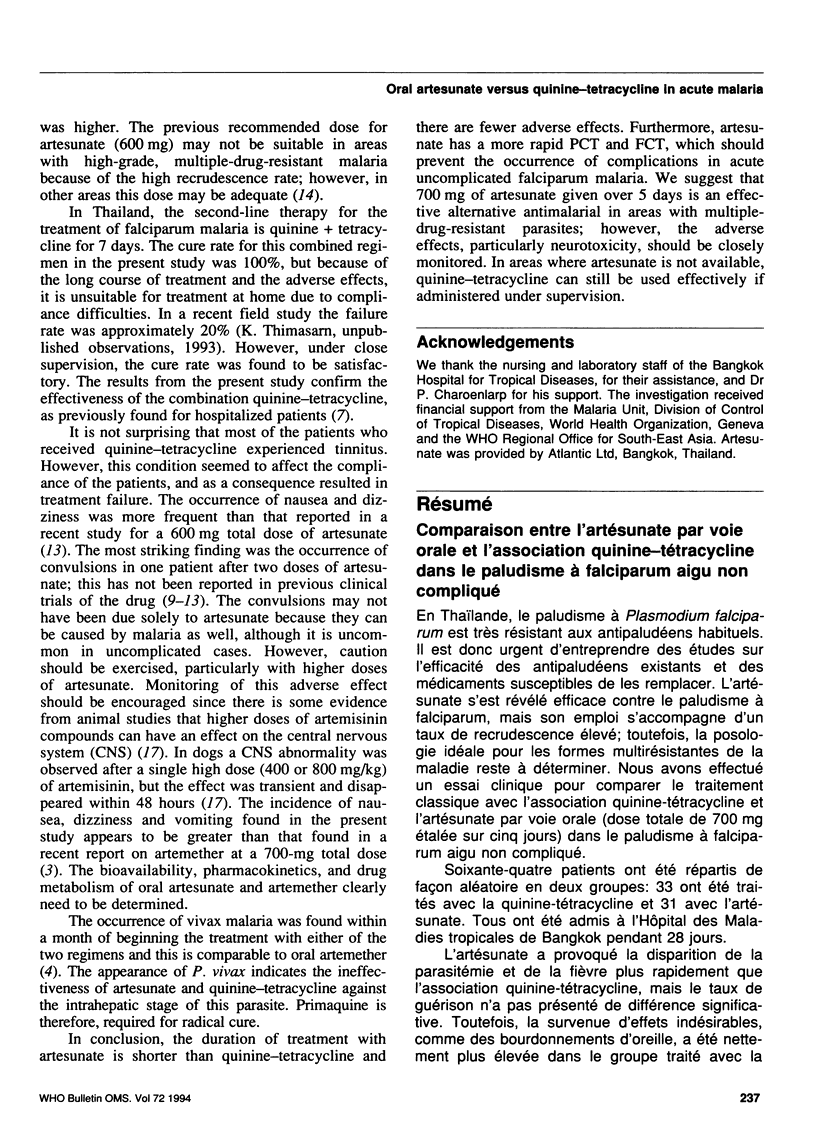
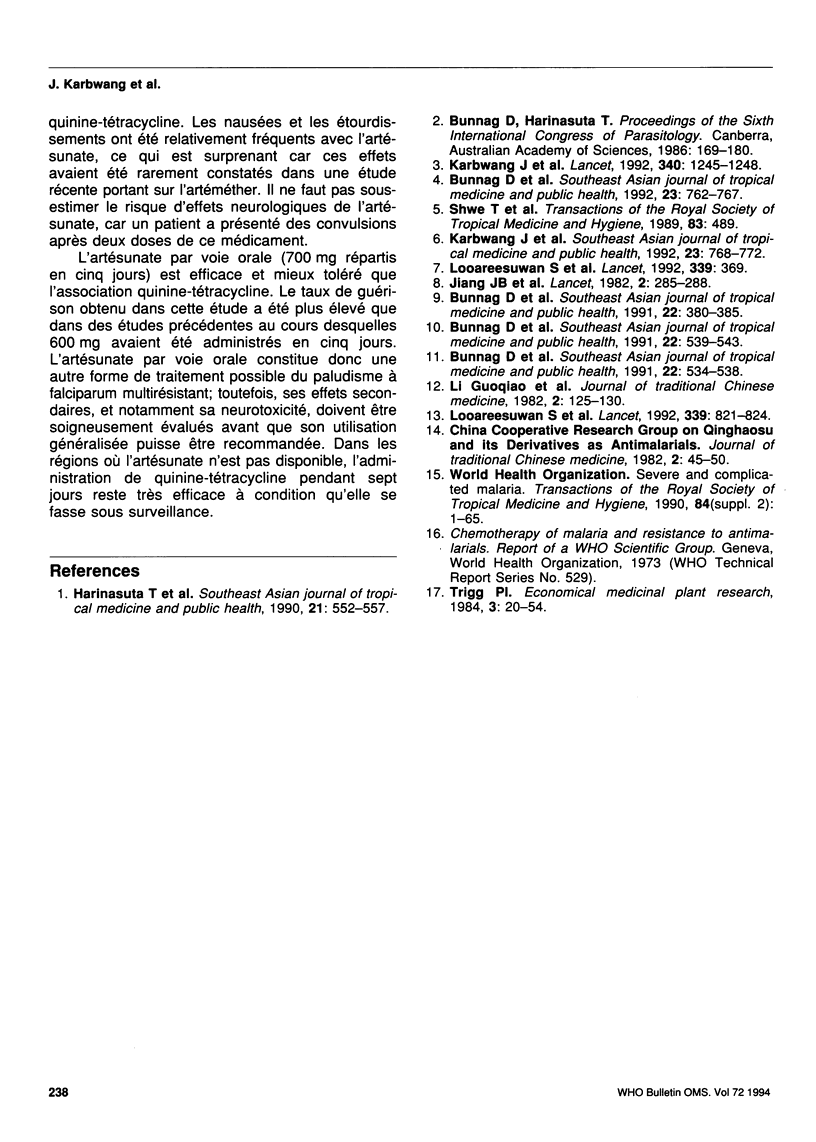
Selected References
These references are in PubMed. This may not be the complete list of references from this article.
- Bunnag D., Karbwang J., Harinasuta T. Artemether in the treatment of multiple drug resistant falciparum malaria. Southeast Asian J Trop Med Public Health. 1992 Dec;23(4):762–767. [PubMed] [Google Scholar]
- Bunnag D., Viravan C., Looareesuwan S., Karbwang J., Harinasuta T. Clinical trial of artesunate and artemether on multidrug resistant falciparum malaria in Thailand. A preliminary report. Southeast Asian J Trop Med Public Health. 1991 Sep;22(3):380–385. [PubMed] [Google Scholar]
- Bunnag D., Viravan C., Looareesuwan S., Karbwang J., Harinasuta T. Double blind randomised clinical trial of oral artesunate at once or twice daily dose in falciparum malaria. Southeast Asian J Trop Med Public Health. 1991 Dec;22(4):539–543. [PubMed] [Google Scholar]
- Bunnag D., Viravan C., Looareesuwan S., Karbwang J., Harinasuta T. Double blind randomised clinical trial of two different regimens of oral artesunate in falciparum malaria. Southeast Asian J Trop Med Public Health. 1991 Dec;22(4):534–538. [PubMed] [Google Scholar]
- Harinasuta T., Bunnag D., Lasserre R. Quinine resistant falciparum malaria treated with mefloquine. Southeast Asian J Trop Med Public Health. 1990 Dec;21(4):552–557. [PubMed] [Google Scholar]
- Jiang J. B., Li G. Q., Guo X. B., Kong Y. C., Arnold K. Antimalarial activity of mefloquine and qinghaosu. Lancet. 1982 Aug 7;2(8293):285–288. doi: 10.1016/s0140-6736(82)90268-9. [DOI] [PubMed] [Google Scholar]
- Karbwang J., Bangchang K. N., Thanavibul A., Bunnag D., Chongsuphajaisiddhi T., Harinasuta T. Comparison of oral artemether and mefloquine in acute uncomplicated falciparum malaria. Lancet. 1992 Nov 21;340(8830):1245–1248. doi: 10.1016/0140-6736(92)92947-e. [DOI] [PubMed] [Google Scholar]
- Karbwang J., Sukontason K., Rimchala W., Namsiripongpun W., Tin T., Auprayoon P., Tumsupapong S., Bunnag D., Harinasuta T. Preliminary report: a comparative clinical trial of artemether and quinine in severe falciparum malaria. Southeast Asian J Trop Med Public Health. 1992 Dec;23(4):768–772. [PubMed] [Google Scholar]
- Looareesuwan S., Viravan C., Vanijanonta S., Wilairatana P., Suntharasamai P., Charoenlarp P., Arnold K., Kyle D., Canfield C., Webster K. Randomised trial of artesunate and mefloquine alone and in sequence for acute uncomplicated falciparum malaria. Lancet. 1992 Apr 4;339(8797):821–824. doi: 10.1016/0140-6736(92)90276-9. [DOI] [PubMed] [Google Scholar]
- Looareesuwan S., Wilairatana P., Vanijanonta S., Kyle D., Webster K. Efficacy of quinine-tetracycline for acute uncomplicated falciparum malaria in Thailand. Lancet. 1992 Feb 8;339(8789):369–369. doi: 10.1016/0140-6736(92)91690-a. [DOI] [PubMed] [Google Scholar]
- Shwe T., Myint P. T., Myint W., Htut Y., Soe L., Thwe M. Clinical studies on treatment of cerebral malaria with artemether and mefloquine. Trans R Soc Trop Med Hyg. 1989 Jul-Aug;83(4):489–489. doi: 10.1016/0035-9203(89)90261-7. [DOI] [PubMed] [Google Scholar]


